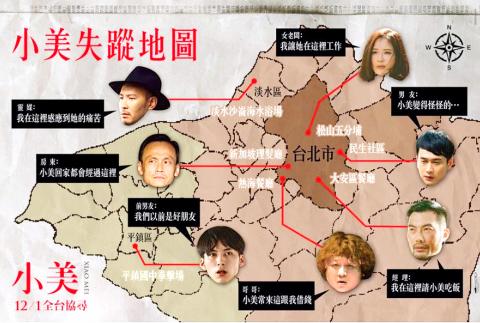No matter how bad, art-house films are usually quite watchable for the first half hour or so. If nothing else, the innovative storytelling techniques and avant-garde aesthetics will keep the viewer’s attention for at least that long. But a good movie still requires a coherent, gripping storyline that actually goes somewhere. This is the only area — but the most crucial one — where Xiao Mei (小美) falls flat as the story builds intrigue but provides too few answers before abruptly ending.
The premise of the story is simple: a young, drug-addicted woman named Xiao Mei, played by Cincin Jao (饒星星), has gone missing. An unidentified cameraman interviews nine people associated with her, each with different motives and connections, to try and piece together what happened.
The opening scene is probably the most entertaining part of the film, as Xiao Mei’s landlord, portrayed by Chen Yi-wen (陳以文) with a thick Cantonese accent, describes his interactions with Xiao Mei while getting a head massage at a traditional barber shop. He occasionally glances at the camera when he gets agitated, and it’s soon revealed that he’s being interviewed. The camera follows him to Xiao Mei’s former apartment while Chen does a splendid job as the unintentional funnyman, delivering absurd one-liners and showing off his father’s martial arts skills, all while moping about how hard life is as a landlord and how much trouble Xiao Mei has caused him. A touch of surrealism is employed when the landlord recalls a previous encounter with Xiao Mei, and past and present merge into one scene.

Photo courtesy of atmovies.com.tw
This blend of past and present and other surreal devices are seen throughout the movie, and are a reason to keep watching. In a flashback sex scene, Xiao Mei’s boyfriend actually pauses mid-action to speak to the interviewer as if he were in the present. The cameraman also seems to be able to film his subjects from improbable positions, for example, when the lens is somehow directly facing the boyfriend while he zips through town on his motorcycle. Characters could be talking to both Xiao Mei and the cameraman in the same shot, then suddenly be interrupted by a passerby. This device is probably necessary for the film to work, otherwise it would just be a series of monotonous interrogations.
Commercial director Maren Hwang (黃榮昇) should be praised for pushing the boundaries and trying new forms of storytelling in his first feature effort. The cinematography, special effects and score are rich and alluring, and the surrealism are adroitly employed so that scenes are offbeat without being absurd. Taipei and other locales in Taiwan are filmed in a gritty and bleak, yet still colorful and dreamy fashion, providing atmospheric respite from the succession of interviews. It’s a feast for the senses, and there’s a reason Xiao Mei has made it into various international film festivals, including the Berlinale. It also claimed the Crossovers Grand Prix at the Strasbourg European Fantastic Film Festival and best cinematography award at the Taipei Film Awards.
However, while stylistically and technically impressive, there is not enough substance to back the film up. The performances seem to weaken after Chen’s interview, and by the fourth or fifth subject, the magic is wearing off as the suspense builds too slowly, even waning at points despite Hwang introducing new flourishes and layers to each vignette in a bid to keep them unique. The way they are put together just doesn’t translate into a full narrative. It’s as if Hwang came up with a brilliant idea for a short film, but was unable to flesh it out into a full-length feature.

Photo courtesy of atmovies.com.tw
More information about Xiao Mei is gradually revealed throughout the film, but she continues to float on the periphery with little character development or depth. She’s already described as a shy person without much of an opinion or friends, and this treatment further dilutes her presence. This is another intriguing maneuver Hwang is trying — to piece together a character through the subjective testimonials of other people, each providing a different take on the same person and events, mirroring the way people are perceived in real life without the input of the actual person.
Xiao Mei could be any troubled young woman in the world, who only exists in the minds of the few people she’s crossed paths with. The audience likely won’t develop a connection with Xiao Mei, but maybe that’s how she would have preferred it.
Despite the flaws in the script, it’s a promising debut from Hwang as the skills and flair are there. It should be interesting to see what he comes up with next.

We lay transfixed under our blankets as the silhouettes of manta rays temporarily eclipsed the moon above us, and flickers of shadow at our feet revealed smaller fish darting in and out of the shelter of the sunken ship. Unwilling to close our eyes against this magnificent spectacle, we continued to watch, oohing and aahing, until the darkness and the exhaustion of the day’s events finally caught up with us and we fell into a deep slumber. Falling asleep under 1.5 million gallons of seawater in relative comfort was undoubtedly the highlight of the weekend, but the rest of the tour

Youngdoung Tenzin is living history of modern Tibet. The Chinese government on Dec. 22 last year sanctioned him along with 19 other Canadians who were associated with the Canada Tibet Committee and the Uighur Rights Advocacy Project. A former political chair of the Canadian Tibetan Association of Ontario and community outreach manager for the Canada Tibet Committee, he is now a lecturer and researcher in Environmental Chemistry at the University of Toronto. “I was born into a nomadic Tibetan family in Tibet,” he says. “I came to India in 1999, when I was 11. I even met [His Holiness] the 14th the Dalai

Following the rollercoaster ride of 2025, next year is already shaping up to be dramatic. The ongoing constitutional crises and the nine-in-one local elections are already dominating the landscape. The constitutional crises are the ones to lose sleep over. Though much business is still being conducted, crucial items such as next year’s budget, civil servant pensions and the proposed eight-year NT$1.25 trillion (approx US$40 billion) special defense budget are still being contested. There are, however, two glimmers of hope. One is that the legally contested move by five of the eight grand justices on the Constitutional Court’s ad hoc move

Stepping off the busy through-road at Yongan Market Station, lights flashing, horns honking, I turn down a small side street and into the warm embrace of my favorite hole-in-the-wall gem, the Hoi An Banh Mi shop (越南會安麵包), red flags and yellow lanterns waving outside. “Little sister, we were wondering where you’ve been, we haven’t seen you in ages!” the owners call out with a smile. It’s been seven days. The restaurant is run by Huang Jin-chuan (黃錦泉), who is married to a local, and her little sister Eva, who helps out on weekends, having also moved to New Taipei